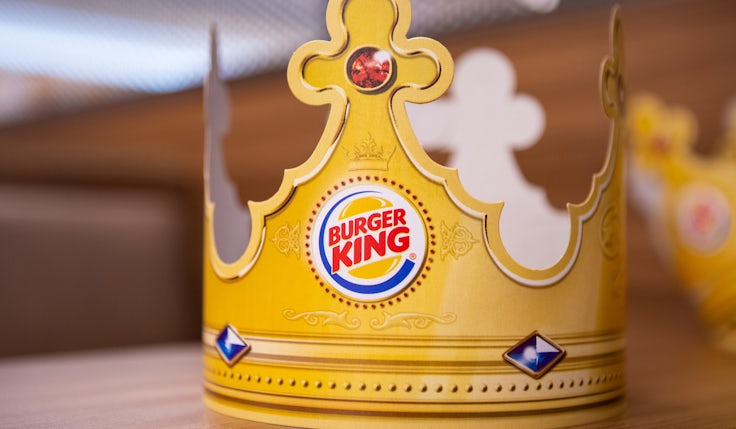The Fernando Machado effect: Analysing Burger King’s brand health journey
As he steps down as CMO, Machado is leaving the fast-food brand in better health than when he started – but there’s still a considerable challenge ahead for his successor.
 Fernando Machado may be stepping down as Burger King’s global marketing boss, but after more than three years in the top role his provocative (and often controversial) marketing campaigns have guided the brand’s health through an upwards trajectory in the UK.
Fernando Machado may be stepping down as Burger King’s global marketing boss, but after more than three years in the top role his provocative (and often controversial) marketing campaigns have guided the brand’s health through an upwards trajectory in the UK.
Yet, while Burger King has improved significantly across a number of key health metrics during the high profile marketer’s tenure, it’s lagging behind its rivals in some areas- particularly when it comes to customer satisfaction and value.
Examining the fast-food giant alongside its competitors on YouGov’s BrandIndex, Burger King has increased its net index score by 4.4 points since Machado took on the CMO position in October 2017, from -3 to 1.4. The index score is a measure of overall brand health, calculated by taking the average of impression, quality, value, satisfaction, likelihood to recommend and reputation.
However, Burger King’s index score remains below average compared to the quick service restaurant (QSR) category as a whole (3.6) and is overshadowed by two of its closest competitors. Over the same period, KFC increased its net index score by 6 points to 1.6, while McDonald’s saw its index score rise by 11.4 points to 8.2.
“YouGov BrandIndex data shows that since 2017, Burger King has significantly improved its brand health and subsequently its index score, with particularly strong advances in the brand’s reputation and impression scores over the years,” says YouGov’s head of account management UK, Amelia Brophy.
She adds that the improvement seen in Burger King’s current index score can be mainly attributed to its customer satisfaction scores and positive impression among consumers. Burger King raised its impression score from 2.3 to 7.7, outscoring the average for the QSR category (6.3).
“However, while Burger King’s brand improvements are significant, it is outperformed by McDonald’s impressive customer satisfaction and value scores,” Brophy notes.
Marketers praise Burger King but McDonald’s is more deserving
On customer satisfaction, Burger King’s score has improved by 4.2 points to 16 since 2017, closing in on KFC’s score of 16.2. McDonald’s, however, grew its customer satisfaction score by 9.2 points to 27.8.
It’s a similar story for value. Burger King has raised its score by 1 point to 3.3, but KFC and McDonald’s lead on scores of 8.1 (+4.5) and 25.1 (+12.1), respectively.
Machado’s successor – Paloma Azulay, the former global CMO for Burger King’s sister brand, Popeyes – will also need to tackle the brand’s declining buzz score (calculated by asking the public daily if they’ve heard anything positive or negative about the brand).
Burger King’s buzz dropped from a score of 1.2 in 2017 to 0.8 in March 2021, well below the average March score for the QSR category as a whole (1.6). Over the same period, KFC achieved a buzz score of 4.8 (+4.0), while McDonald’s scored 6.2 (+7.0).
Machado’s Burger King
Machado first joined Burger King as head of brand marketing in 2014, before being promoted to CMO in October 2017. In January last year he became the chief marketer of the brand’s parent company, Restaurant Brands International (RBI), covering Burger King, Popeyes and Tim Hortons.
Since taking on the CMO role in 2017, Machado has overseen some of Burger King’s most talked about campaigns. The fast-food giant’s marketing strategy has included regularly goading its main competitors through high profile stunts and social media campaigns, which have been either praised as brave and creative, or criticised as more style than substance.
Marketing Week Meets…Burger King CMO Fernando Machado
In 2020, Burger King launched its award-winning ‘Mouldy Whopper’ campaign, which broadcast the image of a rotten Whopper burger to prove that its food contains no preservatives. The campaign also served as an indirect jab at rival McDonald’s, which has been famously accused of selling burgers that never go off.
The year prior saw Burger King again trolling McDonald’s with the ‘Whopper Detour’, a campaign to drive app downloads. When customers got within 600 feet of a McDonald’s location, the app unlocked a deal for a one cent Whopper and offered directions towards the nearest Burger King. It’s estimated that the app was downloaded 4 million times between October and December 2019.
During the Covid-19 pandemic, Machado oversaw RBI as it created campaigns instructing people to stay at home and introduced ‘touchless technology’ into its restaurants.
His final major act as CMO was to rebrand Burger King for the first time in 20 years with a retro-inspired visual identity, new food packaging and restaurant remodelling.
The brand has also had its share of controversy. Last month, Burger King faced a backlash after its UK account satirically tweeted “women belong in the kitchen” on International Women’s Day, intending to highlight its new scholarship programme for female employees. Critics deemed the tweet insensitive and sexist, and Burger King was forced to delete it and apologise.
As Burger King’s IWD ad proves, it’s time to take action on inclusion
Machado is moving on to pick up the CMO role at Activision Blizzard, replacing David Messinger who joined the video game publisher in 2019 as the company’s first global CMO. Machado’s successor at RBI, Popeyes’ CMO Paloma Azulay, claims more than 16 years’ experience in creative brand marketing, including 13 years with Coca-Cola.
Azulay joined RBI in 2018 as global creative head of coffee chain Tim Hortons, and was later promoted to global chief marketing officer. She took up the global CMO role at Popeyes at the beginning of 2020.







Comments